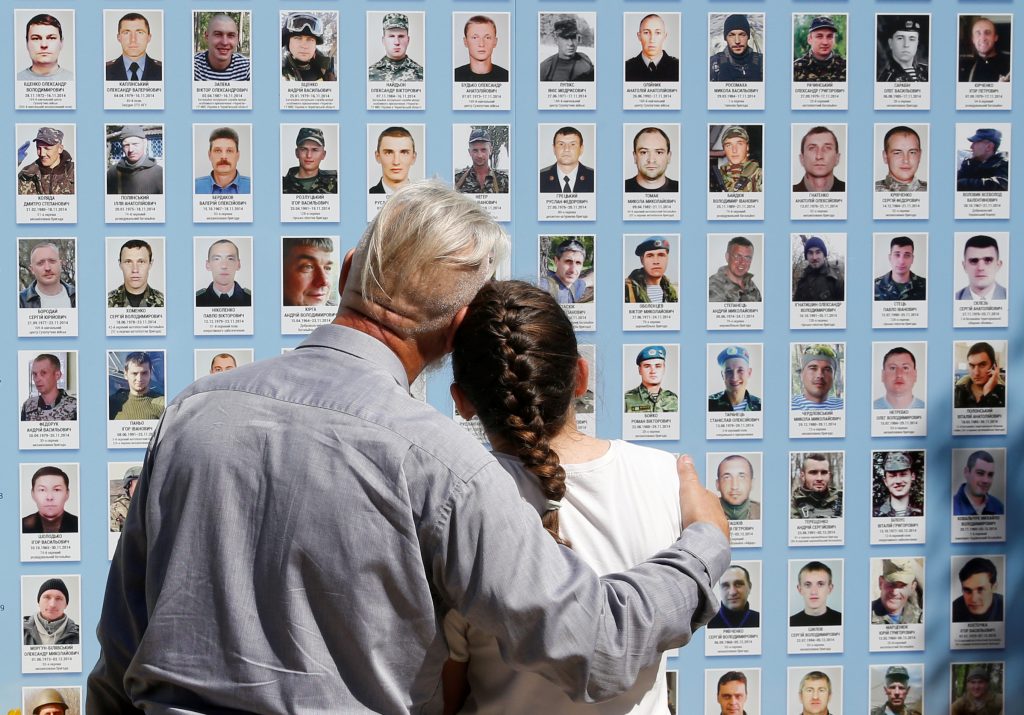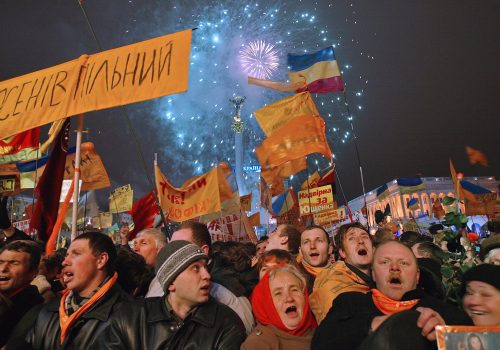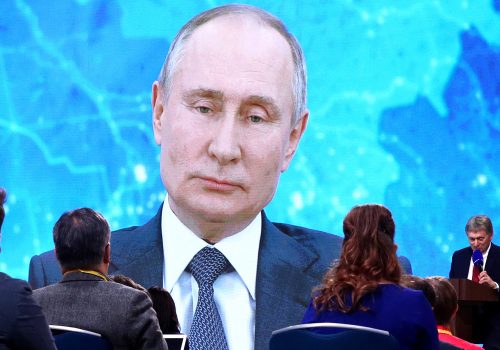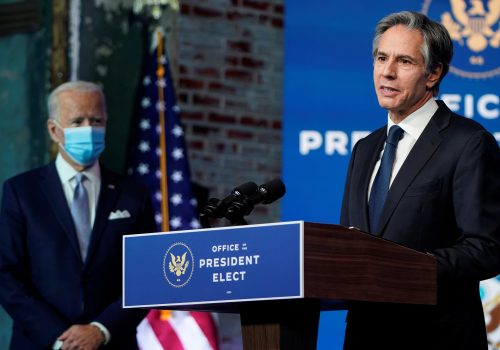With the seventh anniversary of the outbreak of hostilities between Russia and Ukraine now approaching, many people have recently asked me, “What’s next?” As a negotiator in the Trilateral Contact Group formed to end the conflict in Ukraine, and as Ukraine’s minister in charge of the reintegration of the temporarily occupied parts of Donetsk and Luhansk Oblasts and Crimea, I view this question from both perspectives.
The overall impression I have is of Ukraine’s readiness to take steps towards peace along with Russia’s refusal to reciprocate. This makes it difficult to remain optimistic over the chances for a sustainable settlement. Nevertheless, we are not merely waiting for the Kremlin. Instead, Ukrainian policies geared towards future reintegration are already taking shape in anticipation of possible progress.
Ukraine has fulfilled nearly every obligation assumed at the December 2019 Normandy Format Summit in Paris. Since then, there have been two mutual detainee releases. We have designated 19 stretches of land for humanitarian demining, and four new areas for the separation of forces. For the first time since the conflict began in 2014, there has been a five-month ceasefire. Although imperfect, this ceasefire has unquestionably saved lives.
In spring 2020, we strengthened our delegation to the Trilateral Contact Group with government members and heads of parliamentary commissions. In compliance with the Minsk Agreements, Ukrainian representatives of occupied parts of Donetsk and Luhansk oblasts also joined the delegation. In November 2020, we opened two new checkpoints in Luhansk Oblast.
Ukraine has repeatedly demonstrated its readiness to restart the peace process. However, since implementation of the existing agreements is not possible in their present state, updating these agreements is a necessary precondition for any further progress.
The current agreements expired on December 31, 2015. Envisaged as a political and diplomatic agreement rather than an international treaty, the Minsk Agreements are riddled with mutually exclusive demands. Moreover, Russia itself violated the terms of the agreements in February 2015 by seizing the town of Debaltseve and significant amounts of additional land in eastern Ukraine that lay beyond the demarcation line agreed to by its representatives.
Stay updated
As the world watches the Russian invasion of Ukraine unfold, UkraineAlert delivers the best Atlantic Council expert insight and analysis on Ukraine twice a week directly to your inbox.
Despite making some progress, we have failed to achieve any decisive breakthroughs in the peace process since 2015. Ukrainian soldiers are still being killed.
Since summer 2020, our Russian opponents have used every pretext to keep the Trilateral Contact Group paralyzed and to renege on their obligations. Ukraine has presented its plan for the implementation of the Minsk agreements, but the Russian side has failed to present its vision.
The key question now is whether Russia can be persuaded to embrace a modernized version of the Minsk Agreements or a new negotiation format entirely. OSCE representatives have raised this issue, as have our German and French partners. Ukraine is grateful for their support, but we must also note that these efforts have produced very limited results.
Ultimately, progress towards peace hinges on Russia’s willingness, or to be more precise, Russia’s unwillingness, to end the conflict. Any room for further safe steps within the framework of the current agreements is virtually exhausted. The word “safe” is of paramount importance here. Ukraine will not agree to anything deemed unacceptable by Ukrainian society that could destabilize the present situation further. We will not risk a full-scale war in Eastern Europe.
Anticipated political changes in the weeks and months ahead could provide fresh impetus to the stalled peace process. During the coming year, Chancellor Merkel is set to step down. Her departure will leave Vladimir Putin as the only remaining member of the original quartet behind the Minsk Agreements.
Elsewhere, Sweden has now taken over the position of OSCE Chair. In America, Joe Biden will shortly enter the White House. These new leaders will inherit the Ukraine peace process, much like Ukrainian President Volodymyr Zelenskyy and French President Emmanuel Macron.
While we recognize the complexity of this peace process, we are optimistic that the coming changes in political leadership can create new opportunities. For example, we expect the incoming Biden administration to take on a more active role in negotiations. Since the US is a member of the OSCE, their representatives could join the teams of moderators engaged in various subgroups along with representatives of the UK and Canada.
Eurasia Center events

It is also important to note that Ukraine is not waiting passively for progress in negotiations. We are also taking steps to pave the way for the reintegration of the regions currently under Russian occupation.
There is no time to lose. In September 2020, a generation of Ukrainian children started school who have no memory of life before the war. We cannot put their lives on hold indefinitely while we pin our hopes on a political breakthrough. Indeed, in 2020 we had reason to reflect on the years of fruitless meetings in Minsk regarding the Nagorno-Karabakh conflict that preceded the deaths of thousands of young people who died last year in a war their fathers had failed to end.
In order to achieve a viable peace, our efforts go beyond negotiations to include a parallel focus on the areas that will define the post-war future of the Donbas. Ukraine’s approach and policies reflect core UN principles: the right to the truth, the right to justice, and the right to reparations for damages sustained.
We have formulated our vision for bringing war criminals to justice and established amnesty procedures for those who are not complicit in war crimes. We are developing a procedure to recognize birth, death, marriage, and divorce certificates issued in the occupied territories by integrating the Namibia exception into Ukrainian legislation.
We are laying the groundwork for post-conflict administration and law enforcement, including training for public officials and steps towards eventual elections to local government bodies. We are also working to ensure access to the truth regarding Russia’s responsibility for the conflict.
This is our message to the people living in the temporarily occupied regions of eastern Ukraine and Crimea, signaling Ukraine’s efforts to prepare for the transition back to normal life. According to the information at our disposal, this vision for a post-war future is their top priority.
In contrast, Moscow has nothing to offer. It is now increasingly obvious that the Kremlin will never recognize the occupied parts of the Donbas as independent. Nor will Moscow integrate these regions into Russia.
Ukraine’s Strategy for the Economic Development of Donetsk and Luhansk Oblasts constitutes the second part of our plans for the future of the region. The Ukrainian Cabinet of Ministers ratified this concept document on December 23, 2020. By summer 2021, we will prepare a package of bills and a roadmap for the implementation of large-scale economic initiatives.
We intend to create clusters of priority development in government-controlled parts of Donetsk and Luhansk Oblasts to encourage investment. We envision a range of incentives including tax and customs preferences, insurance against military and political risks, and international commercial arbitration.
We recognize that only investors can provide the resources necessary to build a new economy in this war-damaged region. According to a report by the Vienna Institute for International Economic Studies, relief and recovery efforts in the Donbas will require a minimum of USD 21.7 billion.
Ukraine will also commit significant investment towards infrastructure modernization. In addition to investments from the state budget, credit and donor funds have allowed us to create a package of infrastructure projects in Donetsk and Luhansk Oblasts worth over USD 900 million including highway and railway construction, water facilities modernization, improvements in energy infrastructure, agricultural infrastructure upgrades, and much more.
Several infrastructure projects are already underway in partnership with the European Investment Bank, the International Bank for Reconstruction and Development, the governments of France, Germany, Sweden and Canada, and other institutions including Ukraine’s Naftogaz. Our goal is to reach USD 1 billion investment in the first year of the strategy, rather than loans in the industry, agriculture and service sectors.
We aim to ensure the sustainability of local communities, to create new jobs, and to fill local budgets. Following de-occupation, these initiatives will extend to encompass the areas currently occupied by Russia.
We would like to express our gratitude to all those who have supported and continue to support Ukraine. To ensure the long-term viability of this partnership, we believe it should gradually transform from a donor-recipient relationship to win-win cooperation. In other words, efforts to change reality on the ground in eastern Ukraine must yield tangible results for local residents and international partners alike. Two new hubs offering a wide range of services at checkpoints in Shchastia (Luhansk Oblast) and Novotroitske (Donetsk Oblast) are a good example of how genuine progress is possible. These hubs have had an immediate effect on negotiations.
I would like to conclude not as a government official but on a more personal note. I want to believe that the kinder side of human nature will emerge victorious. I want to believe that 2021 will bring lasting peace to eastern Ukraine, followed by economic development and a brighter future. I want to believe that all prisoners will be able to embrace their families, and refugees will get to return to their old homes. We are doing everything in our powers to make this come true. It is time for Russia to demonstrate a similar commitment.
Oleksii Reznikov is Deputy Prime Minister of Ukraine for Reintegration of the Temporarily Occupied Territories.
Further reading
The views expressed in UkraineAlert are solely those of the authors and do not necessarily reflect the views of the Atlantic Council, its staff, or its supporters.

The Eurasia Center’s mission is to enhance transatlantic cooperation in promoting stability, democratic values, and prosperity in Eurasia, from Eastern Europe and Turkey in the West to the Caucasus, Russia, and Central Asia in the East.
Follow us on social media
and support our work
Image: Relatives mourn a family member at the memorial wall in Kyiv honoring Ukrainian soldiers killed in the Russo-Ukrainian War. (REUTERS/Valentyn Ogirenko)





